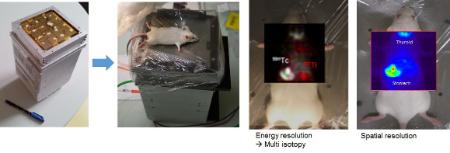DTBS Healthcare department of CEA-LETI
Contact : Eric Gros-Daillon
A subsidiary of the Commissariat à l’Energie Atomique et aux Energies Alternatives (CEA) France’s nuclear and renewable energy commission, Leti was established in 1967 in Grenoble, a university town in the French Alps that has now become an internationally recognized scientific hub. Today, the CEA-Leti is granted over 286 patents a year and handles a portfolio of more than 2,200 patented inventions. The institute employs 1,700 people, while training more than 162 graduate students (38% foreigners), 36 PostDoc and hosting 200 collaborators from its research and industrial partners. It has extensive facilities for micro- and nanotechnology research, and laboratories and equipment that provide first-class nanoscale characterization, chemistry and biology, photonics, design and upstream research capabilities.

Image courtesy of DTBS of CEA-LETI
The Detector Laboratory Department of micro Technology for Biology and Health of CEA-LETI in Grenoble, France, works on integration of technologies in systems using X-ray or gamma-ray for medical imaging, security, NDT and environment for industrials partners. Our imagers could be semiconductor-based spectrometric detectors or CMOS large area integrating sensors and CMOS digital SiPM coupled to scintillator crystals. All operates at room temperature. The skill of this lab is to exploit the detectors performances (spatial and energy resolution, possibility at high count rate) thanks to dedicated electronic (integrated or not) and original methods of information processing. With the help of detector and system simulation, it enables to propose new system architectures.